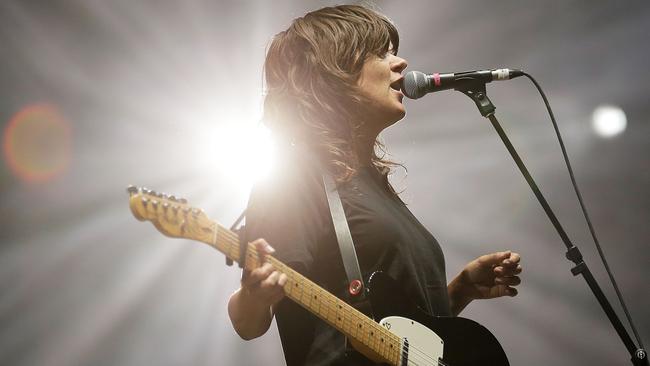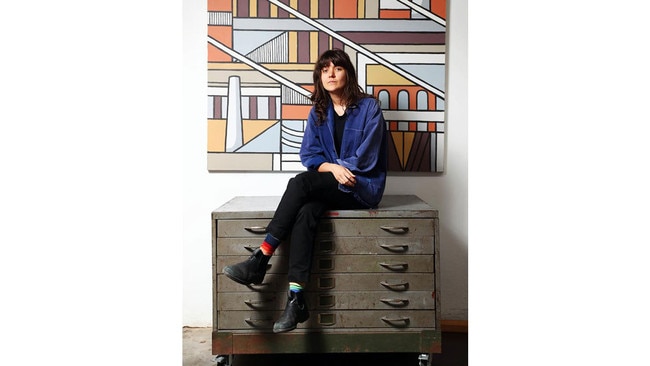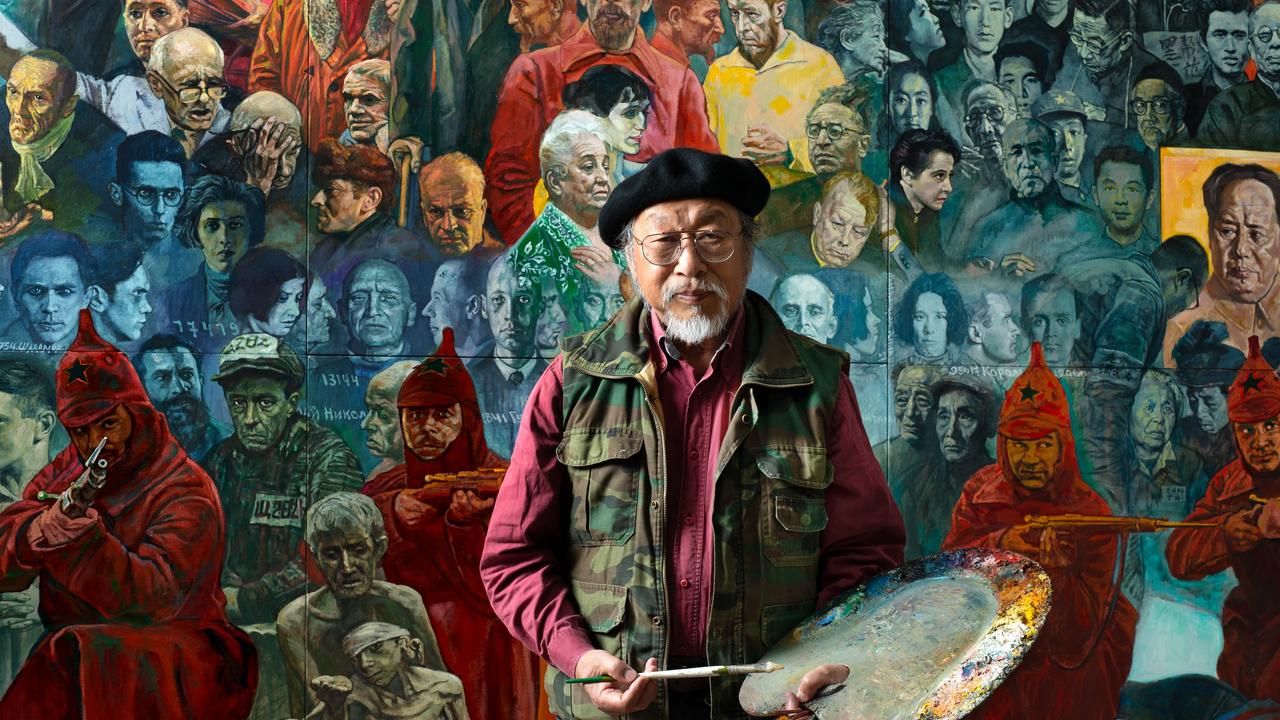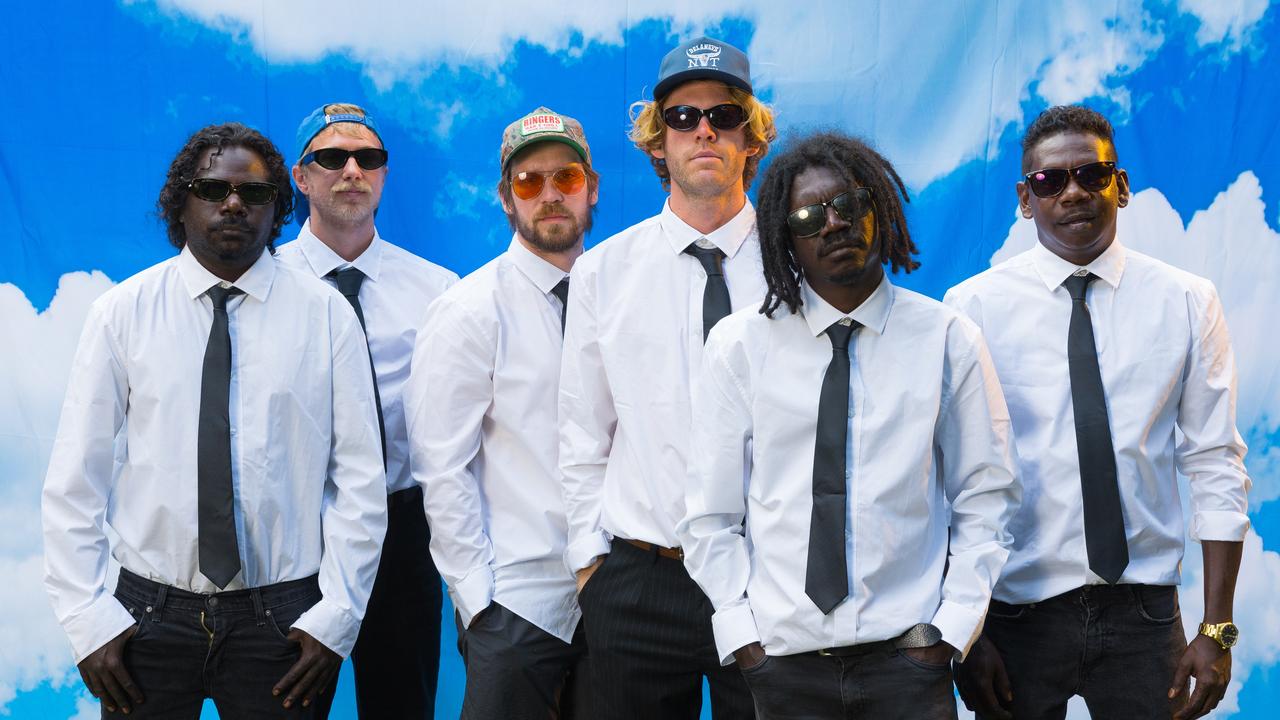Courtney Barnett: Tell Me How You Really Feel, Jen Cloher
Singer-songwriter Courtney Barnett has taken time out from collaborative projects to record her second solo album.

With an electric guitar slung over her right shoulder, a woman dressed in black stands to the right of her three band mates. While the frontwoman, bassist and drummer all play facing the audience, the lead guitarist generally prefers to angle her body at the amplifier when not providing back-up vocals. Her voluminous brown hair is thrust at her effects pedal board, largely shielding her face from those gathered on this Saturday night in March at The Zoo, an inner-city venue in Brisbane.
The band is tight and road-tested, having extensively toured the US in recent months. Its singer and guitarist is Jen Cloher, a Melbourne-based musician whose self-titled fourth album was a finalist for the Australian Music Prize. Her songwriting is unapologetically direct. On Analysis Paralysis, she sings with a sardonic tone: “I pay my fines, taxes on time / But the feral right get to decide / If I can have a wife?”
The eight-minute track is driven by a repetitive bassline and drumbeat, but the closing few minutes are given over to an extraordinary blizzard of noise concocted by the lead guitarist. Unusually for a rock musician, she plays the instrument fingerstyle, sans pick.
Her left hand thrashes away near the pickups of her favourite guitar — a dark Fender Jaguar with a maroon pick guard — while her right hand navigates the fretboard to produce something that is somehow both dissonant and tuneful; violent and coolly controlled. None in attendance can take their eyes off the glorious spectacle of this woman owning the room.
After a resounding cheer at the end of the song, Cloher introduces the guitarist by name with a wry smile, as if she’s a fresh talent, newly unearthed, rather than one of the most popular figures in Australian music today. As if the hundreds in attendance tonight are not already well acquainted with the numerous talents of her partner — her wife — Courtney Barnett.
■ ■ ■
A few days later, away from the spotlight, the musician returns to an unmarked building off a busy road in Coburg, inner-northern Melbourne. Inside, a long room is separated by a white banner bearing the name Milk! Records, the independent label she started in the front room of her home in 2012. Quite a bit has changed in those six years, as Barnett has transitioned from unknown artist to global star.
Stacks of vinyl, T-shirts and CDs line the shelves, while written on a blackboard towards the entrance are several of the label’s forthcoming releases, including her own second album, due in mid-May. On the other side of the enormous Milk! banner is a cosy writing and rehearsal space — “my creative office”, as the black-clad, beanie-wearing musician describes it, taking a seat at a desk strewn with albums, photographs and books.
Waiting on racks nearby are several electric guitars and a couple of acoustics, as well as amplifiers, keyboards and a drum kit lit by fairy lights strung overhead. It’s the perfect set-up for a songwriter to plug in and play when inspiration strikes, and this inner-city locale is where Barnett worked on the 10 songs that comprise Tell Me How You Really Feel.
This room is where she recorded demos of herself playing all the instruments — “mucking around”, as she modestly puts it, belying the painstaking and precise nature of her craft. So far, mucking around has led to playing before thousands of people across much of the English-speaking world, as well as performing on shows such as Saturday Night Live and Ellen, so she’s clearly doing something right.
Barnett began learning to play guitar around the age of 10, thanks to her older brother and some of his friends in the neighbourhood where they grew up on Sydney’s northern beaches. “I think they went through a bit of a phase of it, which is maybe why Mum thought it was a phase for me,” she says. “They had a band, and then they moved on to the next thing. One of them loaned me a little nylon-string guitar and strung it upside down for me, and showed me some songs.”
She recalls one cassette tape from this time, which had a mix of songs by Nirvana, Jimi Hendrix and Green Day — a potent trio of innovative and powerful guitarists. Later, a tutor showed her the foundations of classic Beatles chord progressions, which opened her eyes to the possibility of writing her own songs. She started immediately. Two decades later, she has no intention of stopping.
Now, she is a source of inspiration for budding musicians. “At all-ages shows or festivals, it’s an extreme highlight when a young girl comes up and says she started playing guitar because she heard a song of mine, or sometimes parents at shows tell me about their kids,” she says. “That is really, really cool.”
She claims to have not heard many doubting or discouraging voices while growing up, perhaps in part because her parents worked in the arts: her mother was a dancer with the Australian Ballet, while her father was a graphic designer.
“I was pretty lucky, I think,” she says, then pauses for a moment before laughing and considering another possibility. “Or maybe [those voices] were kind of there, but I just was totally oblivious to it. I was like, ‘You can’t tell me what to do. I’m going to play guitar.’ ”
■ ■ ■
As anyone who has heard one of her songs will attest, though, there is much more to Courtney Barnett than her command of playing six strings at high volume. The 30-year-old also has a distinctive singing voice and a way with words, to put it mildly.
From her partner’s perspective, it has been most pleasing to watch Barnett’s abilities develop on three fronts simultaneously, during the seven or so years they have been a couple. “You just won’t find a Courtney Barnett song that doesn’t have a great natural melody,” says Cloher, who also describes her as “a magnificently beautiful vocalist”.
But of the three areas in which Barnett excels, Cloher appears to value her songwriting above all. “Courtney had this huge success pretty much within a year of releasing her first EP,” she says. “It was easily the first time that a woman singer-songwriter, under her own name, had that kind of success from Australia. That door’s now opening up a lot more, but I feel like she really kicked it in.”
Although Barnett has released only a handful of new tracks as a solo artist since the release of her 2015 debut album ——Sometimes I Sit and Think, and Sometimes I Just Sit, which won four ARIA awards and was nominated for a Grammy — collaborative projects have certainly kept her busy.

In addition to playing on and touring Cloher’s self-titled album, in October last year she also released a nine-song collaboration with Philadelphia-based indie rock songwriter and guitarist Kurt Vile. Titled Lotta Sea Lice, it stemmed from their mutual admiration. “I cherish my intercontinental friendships / We talk it over continental breakfast,” Barnett sings in Continental Breakfast, one of the singles from the album. “In a hotel in East Bumble-wherever / Somewhere on the sphere, around here.”
The gorgeous accompanying clip shows the pair visiting each other’s homes and families, in what might be the sweetest depiction of shared domestic bliss captured in a music video.
They toured the US through October and November, with Cloher supporting — which seems fitting, given she and Barnett fell in love while listening to Vile’s 2011 album Smoke Ring for My Halo.
As well, Barnett and Cloher share the administrative load of running Milk! Records from Coburg, which also allows them to publish music released by artists whose work they admire. Happily, the two of them have structured their lives in such a way that their personal and creative lives frequently overlap.
Cloher observes that Barnett, like the rest of her family, is “very low-key; they don’t walk around talking about themselves a whole lot, which is charming”, she says. “It also can go the other way, where you’re like: ‘Come on, you need to crack open a bottle of champagne, kick back and see all the amazing things you’ve achieved, and celebrate it a bit!’ ”
When this is put to her, Barnett smiles and counters: “We’re both pretty bad at it, really. We’re workaholics. We run our own business — and it’s a weird business, because it’s never stopping. There’s always something going on, which is not a bad thing, because we love it.
“It’s weird when your passion is your work anyway, because there’s that strange line between it — but it’s incredible.”
■ ■ ■
For much of her career to date, Barnett has been accompanied by drummer Dave Mudie and bassist Andrew “Bones” Sloane. On stage and on record, the band consists of a tight trio, although keyboardist Katie Harkin — who also played on the Kurt Vile tour last year — is set to join them on upcoming shows in support of the new album.
Barnett’s calendar for the rest of 2018 is rather full. American dates begin in Texas in a few weeks and continue through Britain and Europe until the end of July, when she will play at the Newport Folk Festival in Rhode Island; an Australian tour will follow.
Although Tell Me How You Really Feel doesn’t feature a guitar solo quite as lengthy or flashy as the wondrous performance Barnett laid down on Cloher’s Analysis Paralysis, her lead breaks throughout its 10 tracks tend to be shorter and more controlled, and fit snugly in the space between verses.
Her love of pithy observations has not abated: “Before we get started, I’ll clean this up / No use drinking from a leaking cup,” she sings on Walkin’ on Eggshells. “You know what I mean? / Not really, it seems.”
Barnett’s slice-of-life lyrics are rooted in sprawling collections of written material. “I try to be really organised, but then I kind of forget what I was doing and I start a new system,” she says of her note-taking process.
“I write in the computer, write on the typewriter, write with the pen — it’s just all over the place. Then I collate it all, highlight parts, and glue it all together.”
Does she prefer any particular medium over the others? “I think they all have different qualities, and bring different things out,” she replies. “It’s nice sitting at home. We’ve got a writing room with Jen’s mum’s desk, which we both take turns writing at.”
That totem was immortalised in the opening track from Cloher’s 2009 album Hidden Hands. In Mother’s Desk, she sings: “Sitting in the winter sun / Waiting for the words to come / But I can tell you what I know / Procrastination never felt so slow.”
The couple got together just before Cloher lost her parents in quick succession: Tom in August 2011, and Dorothy on Christmas Day that year, four years after being diagnosed with Alzheimer’s. Having not experienced that kind of loss herself, Barnett was unsure of how to respond. “I was making it up,” she says. “I know for sure I didn’t have the emotional depth or maturity to deal with it appropriately.”
She pauses, then smiles. “I wrote a song about it called Boxing Day Blues.”
Written as a dialogue, Barnett sings in its second verse: “I’m feeling fine / Except the times I’m not / Why are you so calm? / I wanna shout / I wanna rip my goddamn throat out.”
Together, they got through it, and today Barnett is philosophical about that experience of supporting her grieving partner. “I think you learn from it,” she says. “And if you don’t learn from it, then I guess it’s of no use.”
■ ■ ■
The final song on her second album is called Sunday Roast, and that evocative title is a perfect fit for the warmth captured musically and lyrically. It’s easy to picture Barnett sitting at a crowded dinner table and laughing, while taking mental notes in the magpie way in which all great songwriters are constantly scanning their lives for source material.
Like the video for Continental Breakfast that Barnett filmed with Vile, this song depicts domestic bliss, though of a different sort: the kind where globetrotting loved ones gather for a shared meal whenever their schedules align. “Just bring yourself / You know your presence is present enough,” she sings in the second verse. Its structure is unhurried: the chorus takes nearly three minutes to arrive.
The final lines of Sunday Roast also contain perhaps the strongest melody that she has yet written. “Keep on keeping on, you know you’re not alone,” she sings. “I know all your stories, but I’ll listen to them again.”
Intentional or not, the latter lyric captures what makes her music so arresting, compelling, and worth returning to. It is the sort of creative accomplishment that demands its songwriter crack open a bottle of champagne, kick back and acknowledge all the amazing things she has achieved.
Tell Me How You Really Feel is out on May 18 via Remote Control Records.



